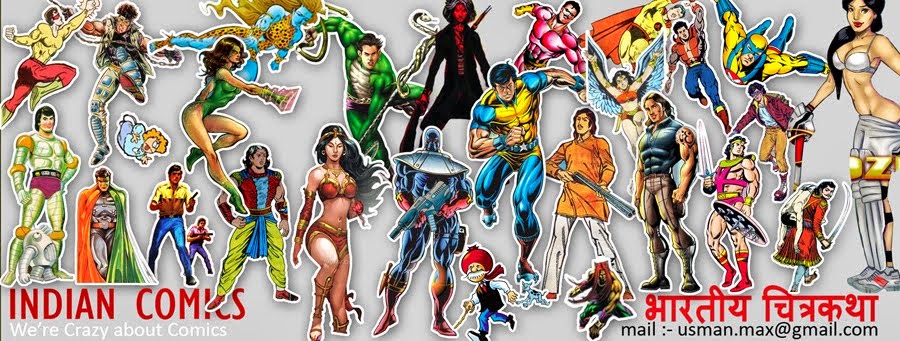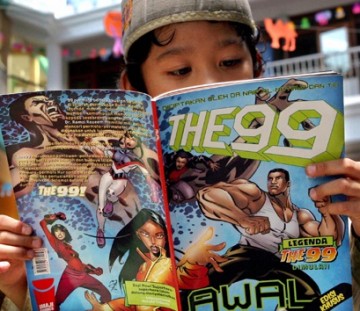Islamic inspired comic superheroes fight for positive values
by Naif Al-Mutawa
Aug 24 2010
Superman, Spiderman… Jabbar
Kuwaiti author’s superheroes could help change the way the world sees Islam
- “The aha moment happened in a cab ride in London exactly seven years ago,” Al Mutawa told Gulf News
- Image Credit: Supplied
Dubai: Seven years ago, Naif Al Mutawa wasn’t really looking for a new business opportunity. He simply wanted to make a difference.
A writer, a clinical psychologist, an entrepreneur and a family man, Al Mutawa is the creator of THE 99, the comic book superheroes born of an Islamic archetype. The name comes from the 99 attributes of Allah in Islam.
Today, THE 99 has received international attention. American President Barack Obama described THE 99 as “the most innovative response” for capturing the imaginations of so many young people through the message of tolerance, during his speech at the Presidential Summit on Entrepreneurship this year. Forbes magazine has also described THE 99 as “one of the top 20 trends sweeping the globe.”
In October, 2010, the Justice League of America, the fictional team of superheroes published by DC Comics, will be teaming up with THE 99.
Batman, Superman, Wonder Woman will be joining forces with the characters from THE 99 like Jabbar, Jami, Batina and their colleagues.
“The aha moment happened in a cab ride in London exactly seven years ago,” Al Mutawa told Gulf News during a phone interview. His sister was pushing him to go back to writing. Al Mutawa had written books for children in the mid 90s, but the thought of going back to writing for children wasn’t on his mind at the time.
The idea was triggered by a fatwa that came out at the time against Pokemon (a kids TV show) where some Arab countries said it was allegedly unislamic, he said.
“My next thought was ‘My God, what has happened to Islam and who are these people making random decisions for my children?’”
As a father of five sons, Al Mutawa was worried about who his kids were going to use as role models.
“I wasn’t happy with how Islam was being seen by others and I didn’t like how Islam was seeing itself.”
That’s when the idea hit and within a few months Al Mutawa raised $7 million (Dh25.7 million) from investors from around the world, including his home country Kuwait, to create THE 99.
He decided this project has to be a world-class project or it wasn’t worth his time or his investors’ money.
Since Al Mutawa’s circles look like triangles as he described it, the team of illustrators behind THE 99 is made up of former and current Marvel and DC Comics writers and artists. It’s a team that has also worked on comic books such as Spiderman, Batman, Wonder Woman and Superman.
“I knew conceptually what I wanted. I knew the characters had to be from 99 different countries, very diverse and not religious.”
Jami the Assembler, Noora the Light, Widad the Loving are three of the superheroes of THE 99. They work together to fight stereotypes, extremism and intolerance.
When asked why he decided to follow through with this, Al Mutawa said that there’s a lot of messaging involved in what he has done and is doing today.
“Anyone can do this,” he said. “Here’s a guy who came up with an idea, raised money and created almost a thousand jobs and was able to create global impact right out of the neck of the desert.”
Al Mutawa also did this because he, as a moderate Muslim, wanted to take on the extremist. THE 99 is his way of fighting back.
If you link enough positive messaging to the same thing that the bad guys are linking negative messaging then they become bad people with bad agendas, he said.
But it didn’t all come easy to Naif Al Mutawa. While the funding came from people who knew him and believed in his ability to pull it off, the time investment put into this project has been tremendous. It has also taken away a lot of time with family.
Lifestyle balance
“It’s tough,” he said. “But I try to balance it out. One in 10 business plans get funded and one in 20 make it, but that doesn’t mean people shouldn’t try.”
Al Mutawa said that entrepreneurship is very much needed in the Arab world even if one idea creates only three jobs or ten jobs.
Published in eight different languages, THE 99 has bigger plans for the future.
Teshkeel Media, which Al Mutawa is the founder and CEO of, will be partnering up with Endemol Group to produce an animated television series for THE 99. Endemol is the company that produced Big Brother, Deal or No Deal, Star Academy and other popular television shows.
“Animation was always in the cards, but I didn’t want to invest money in creating animation that only my children were going to watch,” he said. “I wanted distribution as well.”
Three seasons will be turned into an animated series for global audiences. “We finished the first one and we’re in the middle of season two.”
Although details about when the series will air haven’t been announced yet, the series will be in different countries including the United States and Turkey.
Hollywood talks
Teshkeel Media is also amid talks for a major Hollywood film production of THE 99.
“Ultimately what we believe we have is the next Spiderman and Batman.”
If so many kids from various religions and backgrounds can self-identify with the series, then Al Mutawa would have achieved his objective.
“What we share in common as human beings is a lot more than what we don’t,” he said. “That’s the same as the lesson from Spiderman, Superman and Batman.”
RELATED:
Islam-inspired comic superheroes fight for peace
Fifteen years ago I walked out of a mosque in silent protest of the imam’s sermon. Outside, the heat of the desert sun could hardly match the fire of the rhetoric being spewed forth inside.
The imam was railing against the foreign enemies of Islam and the sinners within. With every genocidal rant came an “amen” from the congregation. Some regrettably came from the heart. Others came from those on autopilot putting in their “time” at the mosque to fulfill their quota of good deeds. Still others were a tradeoff: penance for their sins, an economy of convenience that was born long before Islam and long sold as the path to heaven of other faiths.
It was not the first time I had heard terrible notions of fear and hate peddled in the name of my religion. But that day was different. That day I felt complicit. I had reached a point of intellectual critical mass where my love for my religion overwhelmed my sitting in silence any longer. As I stood up, I stared at the imam to make sure he knew that at least one person would no longer accept the recipe of his revenge.
Islam and Christianity were born in the same neighborhood under similar conditions 600 years apart.
Christianity came about at a time when harsh rulers subjugated their people, making already difficult lives nearly impossible. The people responded to the message of Jesus as they did 600 years later to the message of Mohammad. Both Christianity and Islam offered simple messages to the poor: Live by the rules and your rewards will come later.
Islam came of age at a time of open warfare between what was loosely called Arabia and the occupying Roman Byzantine Empires. It was a religion for the willing believer, further steeled by the Christian Crusades of the 11th and 12th centuries and the Medieval, Papal and Spanish Inquisitions.
Many imams today are still preaching in the rhetoric of the seventh century without regard to contemporary reality. But unlike Jesus and Mohammad, they preach not of future rewards for living a just life as Allah promised. Instead, they offer their rewards to those who devote themselves to the genocide of those who they have anointed our enemies. They prefer not to leave Judgment Day to Allah, instead they substitute themselves as a sort of lower trial court.
We are now in the Muslim month of Ramadan, a time of dawn to dusk fasting intended to teach Muslims about patience, humility, and spirituality. During Ramadan, more than a billion Muslims will congregate at their mosques.
It is finally time that all of us became more accountable for that which our children will be hearing; tiny differences setting us apart rather than celebrating those positive things that bind all good people together. If we allow small-minded men to spout fear and hate in the name of our religion, we will enable them to brainwash another generation as they did our own. And soon, the next generation will fall into a pit of dissonance. To sit by silently makes us all complicit.
As the father of five sons, I worry about who they’re going to be using as role models.
I worry because all around me, even within my extended family, I see religion being manipulated. As a psychologist, I worry for the world in general, but worry about the perception of how people see themselves in my part of the world. Now, I’m a clinical psychologist. I’m licensed in New York state. I trained at Bellevue Hospital’s survivors of political torture program. And I heard one too many stories of people growing up to idolize their leadership, only to end up being tortured by their heroes. And torture’s a terrible enough thing as it is, but when it’s done by your hero, that just breaks you in so many ways.
I left Bellevue, went to business school and started the comic book series “THE 99.” THE 99 references the 99 attributes of Allah in the Koran, things like generosity and mercy and foresight and wisdom.
Fifteen hundred years after the birth of Christ, men representing the Catholic Church poured hot lead down the throats of Muslims and Jews to get them to accept Jesus as their Savior. Fourteen hundred years after Gabriel conveyed God’s message to Muhammad through the Qur’an, a tiny minority of self-aggrandizing Muslims are using the lead of bullets to kill untold numbers in an unspeakable insult to name of Islam.
Today, through THE 99, this proud Muslim is using the lead of his pencil to take a stand. For all our sakes, I hope the pencil really is mightier than the sword.





No comments:
Post a Comment